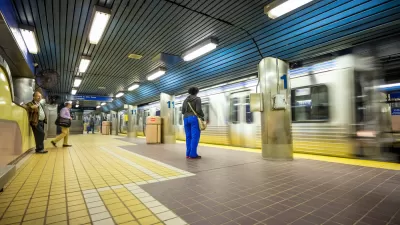Forever plagued with issues, from lack of funding to a lack of political support, Philadelphia's SEPTA mass-transit network is (again) on the verge of collapse.
Daniel Denvir of the Philadelpia City Paper expertly paints the picture behind the colorful past of "[t]he underrated, underfunded, enormous and, yes, aromatic Southeastern Pennsylvania Transportation Authority, known with strained affection as SEPTA" and the social and political concerns placing strains, some would call fatal, on the popularly-used (though not popularly-adored) system.
The most pressing issue at hand is funding constraints, mainly related to political infighting. "Republican politics in Pennsylvania are no longer determined by the commonwealth's challenges," writes Denvir. Pennsylvania Republicans, often ear-to-mouth with the Tea Party, and with Pennsylvania Governor Tom Corbett and Congress offering little support, have left SEPTA largely to fend for itself, despite increasing financial problems. The system's capital funds alone, according to SEPTA chief engineer Jeff Knueppel, lacks the "$600 million" which will be needed to keep the system safe and operation in its current state, let alone any funds for new purchases or expansions of service, despite the growing ridership. Capital investment "now stands near a woefully inadequate $300 million."
Investments in public transportation could mean "jobs created, economy stimulated and people's lives made remarkably easier," says Denvir, but, "[w]ithout the political will from local, state and national elected officials, SEPTA won't ever get back on track.
FULL STORY: Why SEPTA is Heading for a Crash

Alabama: Trump Terminates Settlements for Black Communities Harmed By Raw Sewage
Trump deemed the landmark civil rights agreement “illegal DEI and environmental justice policy.”

Study: Maui’s Plan to Convert Vacation Rentals to Long-Term Housing Could Cause Nearly $1 Billion Economic Loss
The plan would reduce visitor accommodation by 25% resulting in 1,900 jobs lost.

Planetizen Federal Action Tracker
A weekly monitor of how Trump’s orders and actions are impacting planners and planning in America.

Wind Energy on the Rise Despite Federal Policy Reversal
The Trump administration is revoking federal support for renewable energy, but demand for new projects continues unabated.

Passengers Flock to Caltrain After Electrification
The new electric trains are running faster and more reliably, leading to strong ridership growth on the Bay Area rail system.

Texas Churches Rally Behind ‘Yes in God’s Back Yard’ Legislation
Religious leaders want the state to reduce zoning regulations to streamline leasing church-owned land to housing developers.
Urban Design for Planners 1: Software Tools
This six-course series explores essential urban design concepts using open source software and equips planners with the tools they need to participate fully in the urban design process.
Planning for Universal Design
Learn the tools for implementing Universal Design in planning regulations.
Caltrans
Smith Gee Studio
Institute for Housing and Urban Development Studies (IHS)
City of Grandview
Harvard GSD Executive Education
Toledo-Lucas County Plan Commissions
Salt Lake City
NYU Wagner Graduate School of Public Service




























